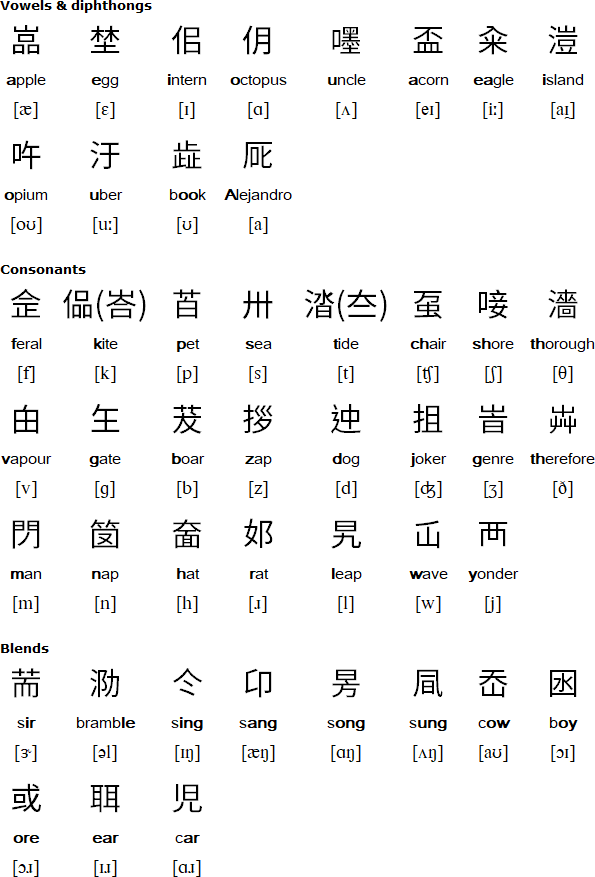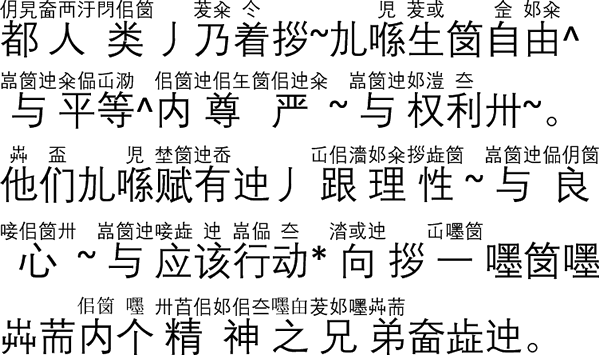Hwayih Woen is a hybrid writing system created by J.Y. Cheung (张子睿) that uses Chinese characters available in Unicode to write the English language, guaranteeing universal availability not only via pen and paper, but also on all digital consumer technology without needing to go beyond what is natively available on any given device.
Hwayih Woen's orthographic architecture, although completely based on Chinese characters, takes enormous inspiration from the Japanese writing system, particularly with regards to the procedure of retrofitting a non-Sinitic language into characters. Although the genesis of Hwayih Woen's creation arose from a need to create functional language pedagogy tools (both from Chinese to English and English to Chinese), in a greater sense, the purpose of Hwayih Woen is to provide the world-wide Chinese diaspora — particularly those overseas Chinese born and raised in the Anglosphere — a language community that is uniquely their own, while still preserving a tangible link back to their ancestral languages, similar to what Yiddish did for the Ashkenazi Jews or Ladino for the Sephardic Jews during the centuries of exile prior to the establishment of the State of Israel after World War II.
Structurally speaking, Hwayih Woen subdivides into two forms: the Junior Script, and the Senior Script. The Junior Script uses 48 archaic characters to represent all sounds of the English language on a 1:1 sound-to-symbol ratio (using the General American accent as a basis). This would be the equivalent of writing Japanese in 100% Hiragana. By contrast, the Senior Script uses standard Chinese logograms on the basis of their meaning, which is then in turn rendered into their corresponding English word, in tandem with the Junior Script phonetic characters — roughly similar to how Japanese handles Kanji.
The name Hwayih Woen, when written in characters, renders as: 华裔文. When using the Latin alphabet, the writing system uses the Gwoyeu Romatzyh transliteration standard.

Download an alphabet chart for Hwayih Woen (Excel)
仴旯奤襾汙閁佀笝丿茇籴仒拶~劜児茇或笝佱邚籴^ 嵓笝迚籴偘屲泐^佀笝迚佀玍笝佀迚籴~嵓笝迚邚溰夳卅~。芔盃劜児埜笝迚岙迚丿屲佀濇邚籴拶歮笝~嵓笝迚偘仴笝唼佀笝卅~嵓笝迚唼歮迚嵓偘夳*涾或迚拶屲嚜笝嚜笝嚜芔荋佀笝嚜卅苩佀邚佀夳嚜甶茇邚嚜芔荋奤歮迚。
都人类丿乃着拶~劜喺生笝自由^与平等^内尊严~与权利卅~。他们劜喺赋有迚丿跟理性~与良心~与应该行动*向拶一嚜笝嚜芔荋内个精神之兄弟奤歮迚。

All human beings are born free and equal in dignity and rights. They
are endowed with reason and conscience and should act towards one another in a spirit of brotherhood.
(Article 1 of the Universal Declaration of Human Rights)
Constructed scripts for: Ainu | Arabic | Chinese languages | Dutch | English | Hawaiian | Hungarian | Japanese | Korean | Lingala | Malay & Indonesian | Persian | Tagalog / Filipino | Russian | Sanskrit | Spanish | Taino | Turkish | Vietnamese | Welsh | Other natural languages | Colour-based scripts | Tactile scripts | Phonetic/universal scripts | Constructed scripts for constructed languages | Adaptations of existing alphabets | Fictional alphabets | Magical alphabets | A-Z index | How to submit a constructed script
[top]
You can support this site by Buying Me A Coffee, and if you like what you see on this page, you can use the buttons below to share it with people you know.

If you like this site and find it useful, you can support it by making a donation via PayPal or Patreon, or by contributing in other ways. Omniglot is how I make my living.
Note: all links on this site to Amazon.com, Amazon.co.uk
and Amazon.fr
are affiliate links. This means I earn a commission if you click on any of them and buy something. So by clicking on these links you can help to support this site.
[top]